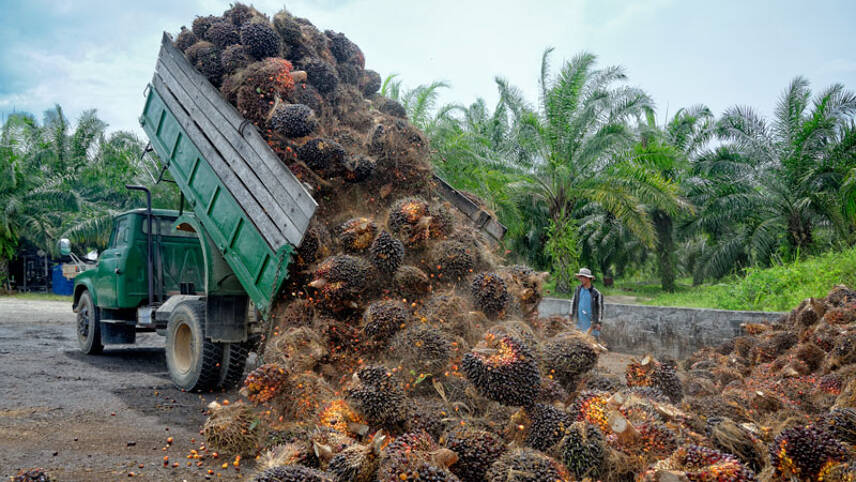Register for free and continue reading
Join our growing army of changemakers and get unlimited access to our premium content

One-third of of the area under oil palm in Indonesia in 2019 was managed by smallholders
Ministers from Indonesia and Malaysia travelled to Brussels late last month to raise concerns over the legislation with EU leaders, outlining the impact the EU Deforestation-Free Regulation (EUDR) could have on their respective economies.
The EU’s deforestation law aims to ban commodities such as cocoa, coffee, palm oil, and wood from entering the bloc if they are linked to the illicit clearing of forests, placing strict certification requirements on companies.
Under the new rules, companies must provide complete traceability, including the precise location goods were produced. They must also prove that farms are not located on lands that have been deforested after 2020.
To manage the risk of non-compliance, companies will have to appoint a compliance person, while a specifically designated authority, to be appointed in each EU member state, will be tasked with checking the statements and due diligence processes of companies and traders.
The regulation provoked a backlash in Malaysia and Indonesia, which criticised the lack of consultation. The Council of Palm Oil Producing Countries (CPOPC), led by the two nations, called the law “inherently discriminatory and punitive in nature”.
Both countries had used the cultivation of palm oil, a lucrative commodity traded globally, as a means to improve the livelihoods of small farmers. Jointly, the two are responsible for around 85% of global palm oil exports.
This progress is now under threat as a result of the deforestation law, according to Indonesian and Malaysian officials.
Smallholder impact
In an interview with EURACTIV, Malaysian Deputy Prime Minister Fadillah Yusof and Indonesian Coordinating Minister of Economic Affairs Airlangga Hartarto said the law could diminish their nations’ efforts to eradicate poverty in line with the United Nations Sustainable Development Goals (SDGs).
“[The EU] deforestation law, for a big company, it’s very easy to comply. The issue will be for the smallholders,” said Hartarto. “Consumers in Europe won’t bear the cost for the extra expense, it will be the farmers.”
One of their chief concerns is that Europe will force businesses to adopt new certification procedures.
Already, the EUDR’s traceability requirements necessitate new technology, according to Hartarto.
“Traceability is an additional cost [due to] administrative procedures,” he said. “You need a consultant, you need to buy a system, you need to buy new services. It basically creates additional business, [to reach] compliance with this.”
Hartarto dismissed the idea that EU rules are necessary to combat deforestation in Indonesia, highlighting that the country has had a moratorium on deforestation since 2011.
“It’s not up to Europe to tell us not to deforest,” he said, noting that the level of forested land in Indonesia far surpasses that of Europe.
In their discussions with European Commission Vice-President Frans Timmermans, Foreign Policy chief Josep Borrell, and Environment Commissioner Virginius Sinkevičius, the ministers pushed for clarity on the compliance requirements, which they said will enable them to calculate the economic impact of the regulation.
“Is Europe introducing something which is beyond what the world has agreed upon? That will be the question,” said Yusof.
“Though we have strong views as far as EUDR is concerned, it has already been approved, so we respect that. But now what we want is for the EU to come back and engage us. There must be engagement,” he added.
The disagreement over the scope of EUDR has reportedly already affected trade talks between the EU and Indonesia, with the introduction of the legislation moving free trade discussions “back to square one”.
The threat of deforestation
EU Green Deal leader Frans Timmermans expressed sympathy for small-holding farmers in Indonesia and Malaysia but remained firm that the law was necessary to meet global climate aims.
During the talks in Brussels, Timmermans explored how the Commission can “empower smallholders” and outlined potential capacity-building projects to assist them.
“He stressed, however, that the law has to be implemented as further deforestation is a direct threat for the survival of humanity,” a Commission spokesperson told EURACTIV.
Asked by EURACTIV about allegations that the law will exacerbate poverty, a European Commission official responded: “The EU deforestation Regulation does not provide any obligation to comply with any certification which could be costly for smallholders”.
“The core of EUDR obligations are not on farmers but on the operators placing products in the scope of the regulation on the EU market,” the official added.
The geolocation requirements can be completed with “a simple smartphone”, according to the Commission official, who played down the level of complexity.
“The low-key requirement for smallholders fully takes into account the social dimension of sustainable development and the need to preserve livelihoods for the most vulnerable,” the official said, adding the regulation is “expected to boost market opportunities for producers who can ensure their products are deforestation-free, regardless of their size”.
Small enterprises will also be granted a longer adaptation period than larger companies, it was confirmed. The Commission is also exploring setting up a “dedicated task force” to keep dialogue open between the trading partners.
Sean Goulding Carroll, EurActiv.com
This article first appeared on EurActiv.com, an edie content partner


Please login or Register to leave a comment.